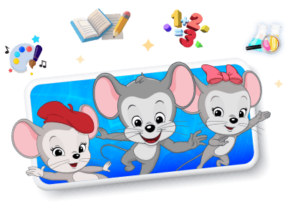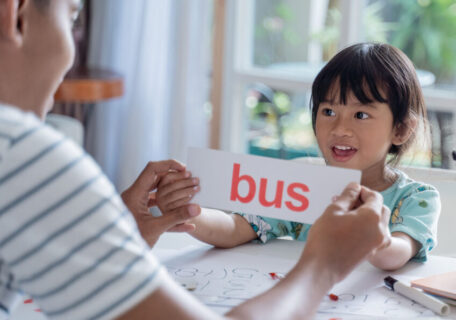
What Is Eclectic Homeschooling?
Learn about the benefits and potential challenges of this style of homeschooling.
Some home educators skip a full commitment to one homeschooling approach and employ their favorite parts of several different homeschooling styles instead, which is considered eclectic homeschooling.
This highly-personalized approach to homeschooling is often popular with families who have experimented with different homeschooling styles over time and learned which elements were most successful and enjoyable for them.
Tip: ABCmouse covers a variety of skills and key educational subjects, providing home educators with a research-backed resource to help support their children’s learning.
What is Eclectic Homeschooling?
Eclectic homeschooling means a home educator picks elements from various educational philosophies to create a homeschool approach perfectly customized to their family.

Some like to describe it as the “Buffet Method.” With endless food available at a buffet restaurant, you get to take your plate and fill it with all the morsels that fit your tastes the best. The same applies to this homeschooling method. Parents are able to choose morsels of material that connect best with their individual child and piece them together into a delicious education plan.
Eclectic homeschooling is highly individualized and allows parents to create a personalized education plan for their children and pivot easily if something is not working.
The eclectic homeschool method can be used at any grade level, from preschool to high school, and is a popular approach for families with children of various ages.
What Does Eclectic Homeschooling Look Like?
Eclectic homeschooling does not have a set approach and differs from family to family. Homeschooling with an eclectic approach could involve the Charlotte Mason approach as you read from Living Books in the morning. You may use a Classical approach to studying history and Latin and a Waldorf approach to science, with much time spent outdoors.
You could then occasionally work in unit studies for topics your children are particularly interested in and round out their foundational studies with an online curriculum. Eclectic homeschooling is highly customized to suit your family’s needs and the goals of your homeschool.

The Benefits of the Eclectic Homeschool Method
One of the biggest benefits of the eclectic homeschool method is its flexibility. It allows parents to tailor their child’s education to their individual needs and interests. This approach can make learning more enjoyable for the child and can lead to better academic outcomes.

The eclectic homeschool method also allows for a more well-rounded education. By combining different approaches and materials, parents can create a curriculum that includes a wide range of subjects and topics. This can help children develop a love of learning and discover new interests.
Another benefit of the eclectic homeschool method is its adaptability. As children grow and their needs change, parents can adjust their approach to meet those needs. This is important if a child is struggling with a particular subject because the parent can switch to a different resource or approach to help the child succeed.
Potential Challenges of the Eclectic Homeschool Method
While the eclectic homeschool style can be highly effective, it does come with its own set of challenges. One of the biggest challenges is the time and effort required to plan and organize the curriculum. Unlike other homeschooling methods, which often offer pre-made curriculum and lesson plans, the eclectic homeschooling method requires parents to research and choose all the materials and resources themselves. This can be time consuming and even overwhelming, especially for parents who are new to homeschooling.
Another challenge of the eclectic homeschool method is the lack of structure. Without a set curriculum or lesson plan, parents may struggle to keep their child on track and ensure they are covering all the necessary subjects and topics. This can be especially challenging for parents who are juggling homeschooling with work or other responsibilities.
Support Your Homeschool with ABCmouse and Adventure Academy
Our digital learning programs are designed by curriculum experts to assist your homeschool and children ages 2 through 13. ABCmouse is a comprehensive online educational platform for children ages 2-8, while Adventure Academy focuses on children ages 8-13. Both programs provide access to lessons on reading, language arts, math, sciences, social studies, and more. Learn more about how each program can enhance your homeschool below.
ABCmouse and Homeschooling
ABCmouse offers over 10,000 learning activities and more than 850 lessons for children, plus a large digital library of books and educational puzzles, songs, activities, and worksheets. The program encourages self-paced learning with motivating rewards and includes progress tracking, which allows home educators to monitor time spent on certain subjects and the number of activities completed.

Then just $14.99/mo. until canceled
As a paid add-on to regular subscriptions, home educators can access the Assessment Center, which allows parents and caregivers to test children on their knowledge, determine successes and struggles, and receive recommended lessons based on assessments.
ABCmouse provides a robust curriculum that can supplement other early learning lessons. It’s trusted resource that’s been downloaded over 10 million times and has a 4.5-star average out of 831.4K ratings.
Adventure Academy and Homeschooling
Adventure Academy combines an interactive world with a curriculum covering reading, language arts, math, science, and social studies. With quests, games, and educational videos and activities, learning becomes an epic journey that motivates kids to explore various topics.
For homeschooling families, Adventure Academy offers an engaging, flexible learning experience that can supplement other educational materials. The program features thousands of activities created by curriculum experts and covers all major academic domains.
Parents and caregivers can choose academic difficulty levels and track each child’s progress, seeing time spent in Adventure Academy, activities completed, and subjects studied.
Adventure Academy emphasizes key topics such as reading comprehension, vocabulary development, mathematical operations, fractions, world geography, American history, physical science, life science, earth science, and scientific inquiry.
For more information, visit AdventureAcademy.com.
More from ABCmouse:
-
How To Teach Kindergarten Addition
This article, reviewed by ABCmouse educational experts, offers expert guidance on nurturing math skills in young learners. From understanding the importance of addition in kindergarten to…
-
2nd Grade Sight Words
Help your second grader excel in reading with this free second grade sight word list printable. Along with benefits and tips and tricks on how to…
-
Best Preschool Vocabulary Words
Explore our list of vocabulary words for preschoolers. From everyday words like colors, shapes, feelings, numbers, to more descriptive words like big, soft, short, smooth learn…
-
How to Teach Phonics to First Graders
Learning about these important steps can help you teach phonics to your first grader. First master consonant blends, second introduce digraphs, third learn about long vowels…
-
How to Teach Phonics to Kindergarteners
Learn the 4 important steps to teaching phonics to kindergarteners. This article covers these important topics. 1- Make letter-sound correspondence automatic. 2- Learn vowels and consonants.…
-
Preparing your Preschooler for Reading
Learn about 3 important concepts that can help you prepare your preschooler for learning how to read. Including fun ideas on how to practice these skills…







